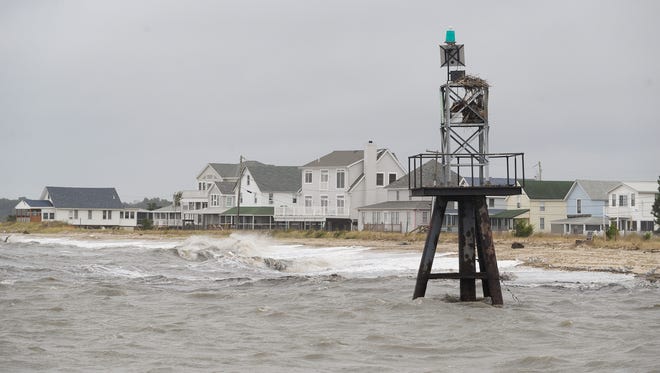New rules for beaches OK'd

State environmental secretary David Small concluded in July that the state's new beach protection regulations, set to take effect Aug. 11, don't infringe on private property rights.
Under the regulations, coastal property owners will still be allowed to rebuild or repair a home or other building, damaged by storm or fire, for instance, to the same footprint as the old structure, Small wrote in his secretary's order signing off on the regulations. That repair or rebuilding allowance applies even if the old building footprint encroaches beyond the building line, Small wrote.
The designated building line, established decades ago, remains unchanged in the new regulations.
And the regulations codify a policy that state officials have used for years to make sure that new structures such as decks don't protrude excessively beyond the building line when compared to neighboring properties.
Jennifer Luoma, a state environmental scientist who worked on the regulations, said that mostly, the newly revised regulations are an update that reflect changes over time to the state's Beach Preservation Act. The regulations are used by the state environmental agency to enforce the requirements in the act.
The old regulations have been in place since 1983, and while the state Beach Preservation Act was changed many times by lawmakers since then, the regulations had not been updated. State officials started a process to update the regulations in 2003 but withdrew their proposal after hearings in 2005 and 2006.
STORY:Hey, Bon Appetit, that’s not a Delaware beach
STORY:Broadkill gets more beach, more people, more trash

During 2015, state environmental officials hosted a series of meetings to develop the new regulations and several workshops to explain the proposed regulations.
Some beach property owners at a public hearing late last year wanted assurances they would be able to rebuild if their homes were destroyed by a catastrophic event like a storm or fire.
Among those concerned: The property association at Sea Colony, which represents more than 2,000 owners. State law allows municipalities to replace boardwalks and other infrastructure if there is storm damage.
Officials from Sea Colony asked to be treated the same way.
Small's finding was that the law and regulations allow property owners to rebuild in their old footprint even if it extends into the building line where no new construction is permitted. The key factors, he wrote, are that property owners work within the existing building footprint and minimize encroachment into and beyond the building line
The state law, adopted in 1972, was designed to protect the state's storm-damaged and eroding beaches and also minimize property damage. The prohibition on construction seaward of the dunes was written in to protect the dunes, a key part of the state's beach protection efforts.
Reach Molly Murray at (302) 463-3334 or mmurray@delawareonline.com. Follow her on Twitter @MollyMurraytnj.